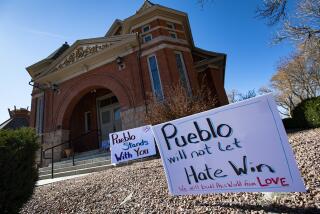Europeans say they are relieved but wary after Bin Laden’s death
Reporting from Rome — The man who inspired deadly attacks on their soil is gone. Much of the fear he inspired is not.
As Europe absorbed the news of the killing of Osama bin Laden, there was none of the spontaneous celebration that erupted on U.S. streets. Plenty of Europeans are glad that the founder of Al Qaeda is dead, but elation here is alloyed with worry that reprisals may lie in store for a continent far closer to the Middle East and South Asia.
“I feel happy, but I’m not as excited as they are in America. He was the head of the serpent — some sort of messiah for the Islamists — but the serpent has more heads and bodies,” Felipe Pascual, a Spanish architect, said in Madrid on Monday. “You kill one leader and they carry on killing.”
Pascual spoke while making his way through Lavapies, the neighborhood where terrorists suspected of belonging to Al Qaeda planned the 2004 attack on Madrid’s railway system that killed nearly 200 people.
A year later, another Al Qaeda-inspired plot claimed more than 50 lives in London when suicide bombers blew themselves up on subway cars and a bus.
So this continent feels perhaps more vulnerable than the U.S. to those who not only embrace Bin Laden’s extremist ideology but try to enact it. Only last Friday, police in Germany arrested three suspected Al Qaeda sympathizers who authorities said had already begun making a bomb for an imminent attack in the Dusseldorf area.
Even as European leaders sent congratulations to President Obama, they were almost unanimous in warning their citizens to remain on guard, belying any sense that their countries were suddenly safer.
“It’s not the end of Al Qaeda. The battle against criminals who call for [terrorism] must be continued without let-up and must unite all countries who are victims of these crimes,” French President Nicolas Sarkozy said.
Many in France are alarmed by the immediate effect that the killing of Bin Laden could have on some of their compatriots.
Five French nationals were abducted in Niger in September by an Islamic group affiliated with Al Qaeda; the kidnappers reportedly told negotiators that they wished to consult directly with Bin Laden to decide their captives’ fate. Two French journalists also have been held hostage by insurgents in Afghanistan for more than a year.
What happens to these various kidnap victims now seems a more ominous prospect than it did a few days ago.
Their plight and the alleged plot uncovered in Germany last week, involving two Moroccan citizens, highlight the diffuse nature of the threat posed by Al Qaeda in Europe.
The organization now has several spinoff or subsidiary groups around the world, including North Africa and the Middle East. Because of Europe’s proximity to and its large number of immigrants from those regions (as well as Pakistanis in Britain), Al Qaeda’s ideas and operatives can filter into the continent from various directions. There are now homegrown would-be terrorists as well.
Al Qaeda agents are often only loosely affiliated. And while they may grieve over the death of the head of the syndicate, the man they see as their spiritual godfather, it won’t necessarily set back their activities and aspirations.
“Symbolically, it’s a shattering moment. Operationally, his removal will not change the reality” on the ground, said Fawaz Gerges, an expert at the London School of Economics and author of the forthcoming book “The Rise and Fall of Al-Qaeda.”
Gerges said that Europe, which has dealt with terrorism for far longer than the U.S. has, tends to look at it in a more pragmatic, political light, rather than the good-versus-evil prism through which many Americans view it. Europeans are therefore more likely to jump on possible consequences of an event such as Bin Laden’s death than celebrate it as a triumph.
“I think they’ll wait a little. Then there’ll be retaliations,” said British retiree Patricia Murphy, 67, as she strolled through a memorial garden dedicated to the Sept. 11 terrorist attacks, in front of the U.S. Embassy in London. “He had money behind him, and there’ll be other groups.”
The most recent terrorist attack to affect Europe, though it didn’t take place on European soil, was the bombing Thursday of a cafe in Marrakesh, Morocco, a popular tourist destination. The blast killed 16 people, including seven French visitors — one of them a 10-year-old girl — and a British man. Moroccan authorities say the attack bore Al Qaeda hallmarks.
The arrests in Germany came the following day. The three suspects, two of them Moroccan nationals, were intent on killing as many people as possible, German authorities told reporters.
German Foreign Minister Guido Westerwelle said Monday that Bin Laden’s death was “good news … that this terrorist has been stopped from continuing his bloody handiwork.” But, he added, “we have to remain vigilant.”
Patricia Bingley, a Briton whose only son, Kevin, died in the Sept. 11 attacks in New York, said she “was gobsmacked” by the news that the U.S. had finally hunted Bin Laden down.
“I just hope that every one of the families of those that died will be as relieved as me,” she told the BBC. “I never thought I would live to see it happen.… I really thought they had forgotten about him and he had just disappeared.”
Times staff writer Janet Stobart in London and special correspondents Hazel Healy in Madrid, Stephanie Kirchner in Berlin and Kim Willsher in Paris contributed to this report.
More to Read
Sign up for Essential California
The most important California stories and recommendations in your inbox every morning.
You may occasionally receive promotional content from the Los Angeles Times.











